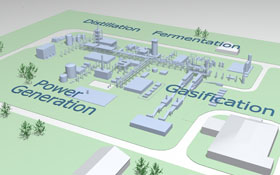Fla. Prepares for $100 Million Biofuel Plant

VERO BEACH, Fla. — Engineering firm AMEC was awarded a $100 million contract to build an ethanol production/biomass plant designed to generate eight million gallons of biofuel a year and produce six megawatts of electricity annually by burning vegetative and agricultural waste like tree stumps, limbs, leaves, and grass.
A joint venture of petrochemical company INEOS Bio and biofuels firm New Planet Energy is developing the Indian River County BioEnergy Center, which construction is expected to begin on this year with a completion date of 2012. The JV partners are known as INEOS New Planet BioEnergy.
INEOS New Planet BioEnergy is using a $50 million grant from the U.S. Department of Energy and a $2.5 million grant from the State of Florida to build the facility. The project is expected to create between 100 and 175 construction jobs and 50 permanent positions.
Dan Cummings, vice president of INEOS Bio, says the Florida plant will be the first commercial-sized facility in the world to use a biofuel production technology that uses municipal, agricultural, yard, and wood wastes versus food crops to create ethanol. Indian River County BioEnergy Center, located on 70 acres, will also be the first commercial-scale ethanol plant in Florida, according to Cummings.
“The technology has been under development for about 20 years,” Cummings says. “Basically, the technology allows someone to take any type of biomass — in this case vegetative, yard, and agricultural waste — and gasify them using oxygen, essentially breaking them down to their natural constituents, which are carbon monoxide and hydrogen. The gas is then cooled rapidly, cleaned, and fed into a bioreactor, which is the biotechnology end.”
“The bioreactor contains our patented microorganism, which converts the carbon monoxide directly to ethanol,” Cummings added. “You end up with an ethanol-water mix that is then distilled, leaving you with a high-grade purified bio-ethanol.”
Steam and off-gassing produced by the process will be fed into a turbine to power the plant and provide a couple megawatts of electricity to a local utility, which has yet to be determined at this time, he says.
“As far as the carbon footprint, there is a favorable lifecycle analysis on this type of technology,” he adds. “It passes all of the Environmental Protection Agency requirements for an advanced biofuel and it also offers the ability to produce green power for the plant and, in this case, the surrounding community.”
Florida poses an ideal site for the ethanol/biomass plant because of state requirements on the biofuel content of gasoline, says Cummings.
“Florida was chosen for a number reasons: first off, Florida is one of the highest biomass producing states in the country, so it has quite a bit of agricultural or vegetative waste material, which is a primary feedstock for the process,” he says. “The other reason is that there is a renewable fuel standard in Florida that requires that fuel sold in the state contain a 10-percent biofuel blend. So there’s a little more than an 800 million gallon demand for biofuel in Florida.”
“We’re interested in building further projects as well as licensing the technology to other companies interested in creating biofuel,” adds Cummings. “So we’re looking at a number of projects right now, but we also have several companies interested in licensing.
“In licensing, we would sell the process design and the actual design of the plant we’re building in Florida,” he adds. “So we would work with someone who licenses the technology to help them put together a package that they could take to a contractor and build their own plant with.”
The Florida plant will serve as a biofuel production training center for licensees, says Cummings.
